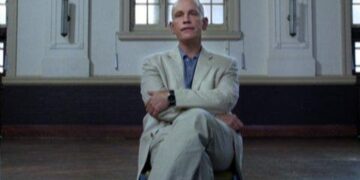J.M. Coetzee, a renowned South African novelist and Nobel Laureate, has captivated readers worldwide with his profound and thought-provoking works. Born on February 9, 1940, in Cape Town, Coetzee’s writing explores complex themes such as identity, power dynamics, and morality.
His unique storytelling style, introspective narratives, and meticulous attention to detail have earned him critical acclaim and a dedicated fan base. As we delve into the fascinating world of J.M. Coetzee, it becomes evident that cinema has played a significant role in shaping his writing.
Exploring J.M. Coetzee’s biography
To understand the profound impact of cinema on J.M. Coetzee’s writing, we must first delve into his biography. Coetzee’s upbringing in South Africa during the apartheid era deeply influenced his perspective on social inequality and racial injustice.
His experiences as a white South African living in a racially divided society provided the foundation for many of his literary explorations. Coetzee’s early exposure to cinema, with its ability to depict powerful narratives and provoke emotional responses, sparked his interest in storytelling and influenced his literary aspirations.
The influence of cinema on J.M. Coetzee’s writing
Cinema has had a profound influence on J.M. Coetzee’s writing, shaping both his narrative style and thematic explorations. Coetzee’s novels are often characterized by their vivid imagery, cinematic descriptions, and meticulous attention to detail. His ability to create immersive worlds and evoke strong emotions in readers can be attributed to his keen understanding of the visual medium.
By drawing inspiration from cinema, Coetzee transcends the boundaries of traditional storytelling, creating narratives that resonate on multiple levels and engage the reader’s senses.
Coetzee’s exploration of power dynamics and moral complexities within his works is reminiscent of the way cinema examines societal structures and human behavior. Just as a film director carefully constructs scenes to convey meaning, Coetzee meticulously crafts his narratives to explore the intricate nuances of power, morality, and human relationships. His use of dialogue, imagery, and symbolism mirrors the way cinematic storytelling unfolds, creating a rich and immersive reading experience.
Furthermore, Coetzee’s deep appreciation for cinema is evident in his exploration of the human condition. Like films, his novels often delve into the depths of human emotions, exposing the vulnerabilities and complexities that lie beneath the surface. By intertwining elements of cinema into his writing, Coetzee provides readers with a unique and profound literary experience.
J.M. Coetzee’s love life and friendships
While J.M. Coetzee is primarily known for his literary achievements, his love life and friendships have also played a significant role in shaping his personal and professional journey. Coetzee’s relationships, though often private, have provided him with emotional support and inspiration throughout his career.
Coetzee’s love life has been a subject of curiosity among his readers. Although he has been discreet about his personal life, it is known that he was married twice. His first marriage, to Philippa Jubber, ended in divorce.
Coetzee later married Dorothy Driver, a fellow academic and literary scholar, with whom he shares a deep intellectual bond. Their partnership has undoubtedly influenced Coetzee’s writing, as shared interests and intellectual discussions often find their way into his works.
In addition to his romantic relationships, Coetzee has also formed meaningful friendships with other literary figures. These friendships have not only provided Coetzee with a sense of camaraderie but have also served as sources of inspiration and intellectual stimulation.
By surrounding himself with like-minded individuals, Coetzee has been able to engage in thought-provoking conversations and exchange ideas, further enriching his literary pursuits.
The role of backbiting and gossip in J.M. Coetzee’s life
Like any public figure, J.M. Coetzee has faced his fair share of criticism and gossip throughout his career. Backbiting and gossip are an unfortunate reality that many esteemed authors have to contend with, and Coetzee is no exception.
However, it is important to separate the personal from the professional when analyzing Coetzee’s literary contributions.
Criticism, whether constructive or malicious, can often influence an artist’s creative process. For Coetzee, the scrutiny he has faced has undoubtedly shaped his writing and contributed to his introspective and thought-provoking narratives.
Rather than allowing the opinions of others to deter him, Coetzee has used criticism as a catalyst for growth, continually pushing the boundaries of his storytelling and challenging societal norms.
It is worth noting that while backbiting and gossip may be prevalent in the literary world, they should not overshadow the immense impact and enduring legacy of Coetzee’s work. His contributions to literature and his ability to provoke meaningful discussions through his writing far outweigh the noise of idle gossip.
J.M. Coetzee’s life outside of writing
While J.M. Coetzee is primarily known for his literary prowess, his life extends far beyond his writing. Coetzee’s interests and pursuits outside of literature provide valuable insights into his multifaceted personality and the diverse range of influences that shape his work.
Coetzee has been an avid cyclist throughout his life, finding solace and inspiration in the physical act of riding. His passion for cycling mirrors his approach to writing, as both require discipline, perseverance, and a deep understanding of oneself.
Coetzee’s love for cycling not only serves as a source of personal fulfillment but also influences his writing by fostering a sense of introspection and contemplation.
In addition to cycling, Coetzee is also known for his passion for music. He is a proficient pianist and finds solace in the harmonies and melodies of classical compositions. Music serves as a form of emotional expression for Coetzee, allowing him to tap into the depths of human emotions and translate them into his writing.
The interplay between music and literature is evident in Coetzee’s works, where he often uses language to evoke the same emotional responses that music elicits.
Coetzee’s diverse range of interests and pursuits outside of writing demonstrate his insatiable curiosity and his desire to explore different facets of the human experience. By immersing himself in various artistic and physical endeavors, Coetzee continues to evolve as a writer, enriching his narratives and captivating readers with his unique perspective.
The significance of rich and poor in J.M. Coetzee’s works
One of the recurring themes in J.M. Coetzee’s works is the exploration of social inequality and the stark contrast between the rich and the poor. Coetzee’s ability to portray the complex dynamics and power imbalances between different socioeconomic classes is a testament to his keen observation and deep understanding of human nature.
Throughout his novels, Coetzee depicts the harsh realities faced by the marginalized and oppressed, shedding light on the systemic injustices that perpetuate social inequality.
His characters often navigate a world where power and privilege are concentrated in the hands of a few, highlighting the stark contrast between the lives of the affluent and the impoverished.
Coetzee’s exploration of wealth and poverty serves as a critique of societal structures and the inherent inequalities that perpetuate them. By exposing the stark disparities between different socioeconomic classes, he challenges readers to question the status quo and consider the moral implications of their own privilege. Coetzee’s works serve as a powerful reminder that social inequality is not simply an abstract concept but a lived reality for many individuals around the world.
J.M. Coetzee’s exploration of the bond between literature and cinema has enriched his writing and captivated readers worldwide. Through his unique narrative style, profound exploration of themes, and keen observation of the human condition, Coetzee has solidified his place as one of the most influential writers of our time. His ability to seamlessly integrate elements of cinema into his novels sets him apart and demonstrates the enduring legacy of his work.
As we continue to unravel the intriguing bond between J.M. Coetzee and cinema, we gain a deeper appreciation for his contributions to both literature and the cinematic world.
His ability to transcend traditional storytelling and create immersive narratives has inspired countless readers and filmmakers alike. Whether his books and characters become movies or other media, the impact of Coetzee’s work on literature and cinema is undeniable.
For fans of J.M. Coetzee, delving into the works of other artists who have inspired him can provide a deeper understanding of his writing and creative process. It is also worthwhile to explore recommended books by other writers, as their works may resonate with Coetzee fans and offer new perspectives on similar themes.
Conclusion
J.M. Coetzee’s enduring legacy as a writer continues to shape the literary and cinematic landscapes. His exploration of complex themes, his profound understanding of human nature, and his unique blending of literature and cinema have left an indelible mark on both art forms.
As we celebrate his contributions, let us continue to appreciate the profound impact of J.M. Coetzee’s work and explore the rich tapestry of his literary universe.
Enjoyed what you read? Show your support and fuel our fight by treating us to a coffee or purchasing captivating books of J. M. Coetzee on Amazon via this link.
The WFTS crew is fuelled by a fervent desire to safeguard the timeless allure of books, ensuring it never fades in the glare of the big screen.
We’re committed to presenting our work without the distraction of irrelevant and irksome banner ads.
Join us in this modern revolution to uphold the enduring magic of transmuting cherished books into Movies and TV shows









